News
Soludo: A Pragmatic Economist and Statesman for Nigeria’s Future
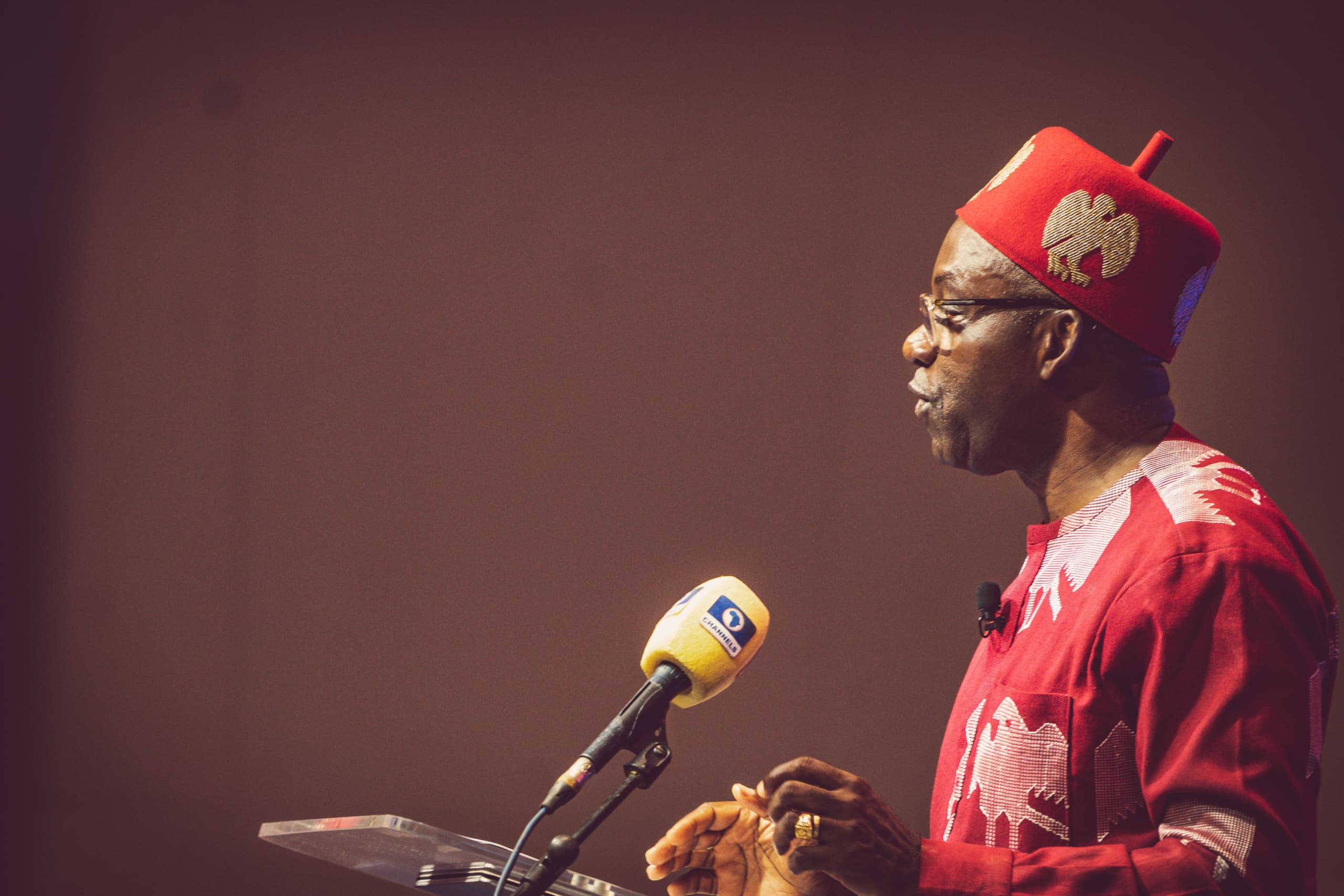
By Christian ABURIME
In a riveting address delivered at The Platform, a special national policy dialogue celebrating Nigerian democracy on June 12 in Lagos, Anambra State Governor, Professor Chukwuma Charles Soludo, CFR, perceptively dissected national issues and articulated a compelling vision for Nigeria’s economic and political future. Invited as one of the guest speakers, Governor Soludo did not just show up as a governor, but as an erudite public intellectual and hands-on leader, as he displayed the rare combination of brilliant economic insights and statesmanlike vision that Nigeria desperately needs.
His speech on the subject of Sustainable Democracy and Free Market Economy touched base with the contemporary challenging times, highlighting his profound understanding of Nigeria’s economic challenges and presenting a roadmap for national recovery. With a depth of knowledge honed over decades as an academic, international consultant and former Central Bank governor, Prof. Soludo diagnosed the deep-rooted ills afflicting Nigeria’s battered economy with clinical precision.
He exposed the structural flaws, policy inconsistencies, and lack of productivity that have turned a potentially prosperous nation into a staggering giant struggling under a mountain of debt. In the end, he also propounded solutions in such a way that any dispassionate listener would come away with a genuine impression that Governor Soludo’s comprehensive diagnostic approach and exemplary leadership qualities underscore his potential as the pragmatic, paradigm-shifting leader Nigeria needs in the near future.
Prof. Soludo, with his illustrious academic background and distinguished career, has always been an icon of intellectual rigour and policy innovation. His tenure as the Governor of the Central Bank of Nigeria is still remembered for the significant reforms that stabilised the banking sector. Soludo’s deep-seated knowledge of economic principles and his pragmatic approach to policy-making were evident in his Platform speech. Some of his remarks are as profound as they are reflective of the man’s depth of mind. A few quotes from his speech will suffice.
On the dynamics of democracy and free market economy, Soludo said “It needs to be emphasized however that democracy and market economy are dynamic and permanent work-in-progress, requiring constant contestations among interest groups in the struggle towards a more perfect society.” He continued, “The state of the economy is therefore the determinant of enduring democracy, and for most people, democracy is a key pre-requisite for sustainable economic transformation. Democracy and, indeed, any form of governance must deliver tangible social and economic benefits to the generality of the citizens to be credible and sustainable.”
On admitting the reality of Nigeria’s true economic condition, Prof. Soludo was downright frank: “Let’s admit a fact which most Nigerians don’t seem to appreciate. Nigeria is a very poor country, and its public finance is broken. This admission is critical to any reasonable discourse on the road ahead.” To fix the broken public finance, Soludo implied thus: “Given the humongous infrastructure deficit, the consolidated public sector (FGN and States) capital spending should be at least 10-15% of GDP per annum. Currently, it is less than 5%. Indeed, the entire budget of the FGN is probably less than 30% of what we need to be investing in infrastructure per annum.”
On economic solutions, Soludo went further to emphasize thus: “There is an emergency, and incremental changes won’t cut it. Intentional systemic disruptions are urgently needed but it requires mass mobilization and ownership by the public. Suffice it to say that fixing the systemic insecurity, broken public finance and economy, broken oil and gas sector, infrastructure and environmental decay, rising social tensions, and restoring hope and confidence of the citizens would require us to try several roads not travelled – thinking and acting without any box!”
But how does Soludo see the efforts of the current president in tackling the volatile economy? Hear him: “I believe that President Tinubu (the man who fought the FGN to a standstill over the power of Lagos State to design the local government system of its choice, championed the fundamentals of true federalism 2003-2007, and tamed the Atlantic Ocean) has the knowledge and courage to mobilize Nigeria to cross over the current crossroads. There are no easy or quick fixes, and he needs our collective support.”
Reflecting his own empathetic nature, sensitivity and emotional intelligence as a leader, Soludo expressed a most touching thought on the current hard times most Nigerians are facing: “As a person, I deeply feel the pains of all Nigerians at these challenging times, especially the over 100 million Nigerians who are multi-dimensionally poor. Times are hard. Sometimes I wish that I can give every resident of my state N1 million each to cushion the effects of the hard times.”
But the professor of economics is more than just an economic theorist – he is a leader taking bold actions to put his ideas into practice in Anambra State. Since assuming office over two years ago, he has led by example through prudent spending, patronising made-in-Nigeria products, and displaying genuine empathy for the common man. His commitment to social justice is a cornerstone of his governance philosophy, making him a leader who truly understands and addresses the needs of his people.
According to Soludo, addressing the needs of common Nigerians “will require a fundamental reordering of national priorities to invest massively in social programs (especially health, education and social protections) as well as infrastructure to give everyone a stake in the national cake, thereby securing the future. I am an Awoist and a true progressive on this front.” In fact, Soludo’s Awoist priorities are re-establishing social services in education where he has employed thousands of quality teachers and abolished tuition fees; in healthcare where more personnel are being employed and pregnant women enjoy free antenatal care; in economic security for the senior citizens and underprivileged; and in infrastructural development – all without resorting to piling on more debt.
Nigeria’s economic malaise is quite convoluted and Governor Soludo’s analysis of the woes was extraordinarily incisive. Over and over, he identified structural deficiencies, rampant corruption, and over-reliance on oil revenues as key impediments to economic stability. His critique was not just a lamentation of Nigeria’s economic troubles but a call to action. Soludo emphasized the need for economic diversification, robust governance frameworks, and an enabling environment for entrepreneurship and innovation. His insights reflect a deep understanding of the interconnectedness of economic policies and social outcomes, and the impact on our democracy.
Again, in an era where public trust in leadership is waning, Governor Soludo exemplifies integrity and accountability. His prudent fiscal management in Anambra State offers an exemplary model in transparency and efficiency. By prioritizing locally-made products, Soludo not only supports Nigerian industries but also fosters a sense of national pride and self-reliance. His administration’s fiscal discipline, avoiding excessive borrowing, demonstrates a responsible approach to governance that prioritizes long-term stability over short-term gains. Little wonder, Anambra State under his leadership has been rated one of the top 5 fiscally sustainable states in Nigeria, according to BudgIT.
One of the defining characteristics of Governor Soludo is his unwavering political will to implement bold reforms. His tenure so far as Anambra State’s governor is marked by decisive actions that, while sometimes unpopular, are necessary for sustainable progress. At the risk of repetition, Soludo’s stance against needless borrowing to fund government activities is a courageous deviation from the norm, reflecting his long-term vision for financial independence and economic sovereignty. His leadership style is characterised by a fearless pursuit of policies that ensure a resilient and self-sufficient economy.
As Nigeria grapples with multifaceted challenges, the need for future perceptive leaders and profound thinkers like Professor Charles Soludo has never been more apparent. His blend of academic excellence, practical governance experience, and compassionate leadership positions him uniquely as a statesman capable of steering Nigeria towards a prosperous future. Soludo’s vision for a sustainable democracy and a thriving free market economy offers a blueprint for national recovery and growth. His emphasis on prudent spending, local patronage, social security, ethical reset and fiscal responsibility encapsulates the principles of good governance.
Of course, Nigeria has no shortage of brilliant thinkers and economists diagnosing its woes. But the nation is desperately short on statesmen willing to walk the difficult path of reform and restructuring rather than taking the easy road of corruption and deficits. In Governor Soludo, Nigeria may have found a future leader with both extraordinary intellect and the fortitude to transform his ideas into reality through hard work and political vision.
At times of low morale when citizens need inspiration, Soludo also shows that he is a leader who doesn’t give up. Hear him: “I am an incredible optimist in the potential greatness of this blessed country. That’s essentially why I have persisted in public service and applied for my current job. I believe in the infinite possibilities and opportunities that Nigeria presents. Our youthful population, if unleashed, will definitely conquer the world and the 22nd Century will be Nigeria’s century.”
As Nigeria looks to the future, it should hold up Governor Soludo as a model for the type of transformative yet principled leadership it needs to achieve sustainable democracy wedded to free market prosperity. An accomplished scholar and public servant, Soludo represents hope that Nigeria can rise to its full economic potential by finally having a combination of a brilliant economic diagnosis, empathetic leadership, self-sacrificing prudence, boldness of action and the pragmatic prescription to cure what ails it.
Christian Aburime is the Press Secretary to Governor Soludo.
Business
Dangote Refinery to supply 1.5bn litres of petrol monthly
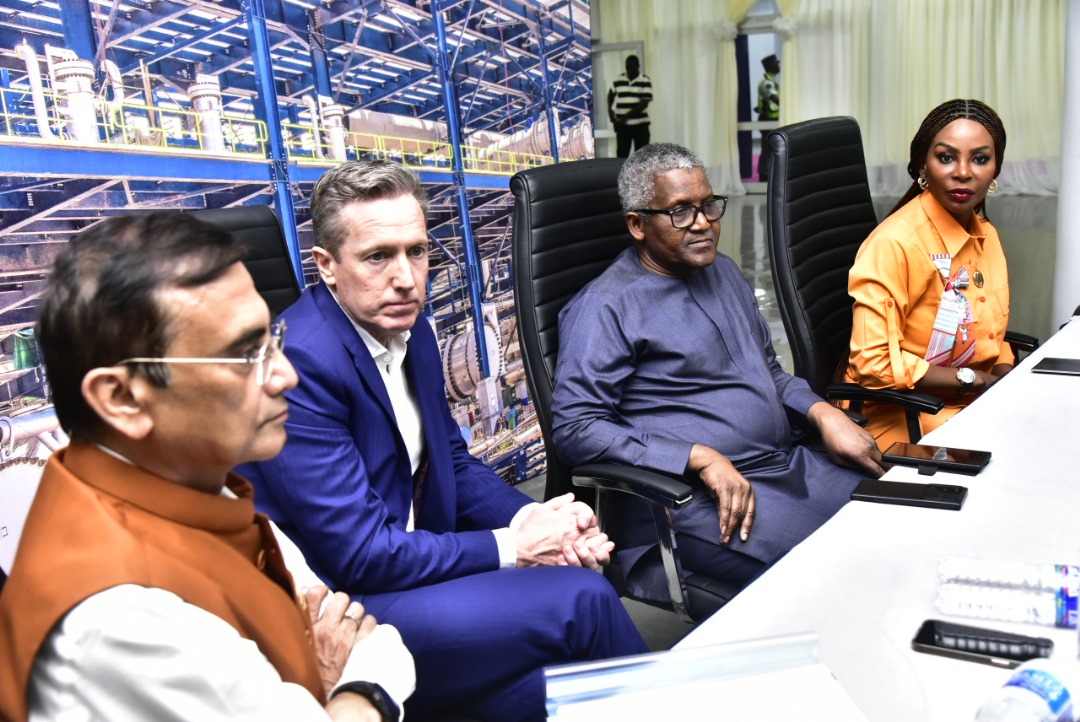
….Writes NMDPRA, Engages Marketers to Stabilise Fuel Market
Photo caption: L R: Chief Executive Officer, Dangote Fertiliser Limited, Vishwajit Sinha; Chief Executive Officer and Managing Director, Dangote Petroleum Refinery, David Bird; President and Chief Executive, Dangote Industries Ltd, Aliko Dangote; Managing Director and Chief Executive Officer, South South Development Commission, Usoro Akpabio, during the visit of SSDC members to the Dangote Petroleum Refinery and Fertiliser Plant in Lagos on Sunday, November 30, 2025.
Dangote Petroleum Refinery has announced plans to supply one billion five hundred million litres of Premium Motor Spirit (PMS) monthly to the Nigerian market in December 2025 and January 2026, a move aimed at ensuring uninterrupted nationwide fuel availability through the festive season and into the New Year.
President and Chief Executive of Dangote Industries Limited, Aliko Dangote, disclosed the plans at the weekend, noting that the refinery will make available 50 million litres of PMS daily beginning December 1.
“In line with our commitment to national wellbeing, and consistent with our track record of ensuring a holiday season free of fuel scarcity, the Dangote Petroleum Refinery will supply 1.5 billion litres of PMS to the Nigerian market this month. This represents 50 million litres per day. We are formally notifying the Nigerian Midstream and Downstream Petroleum Regulatory Authority (NMDPRA) of this commitment. We will supply another 1.5 billion litres in January and increase to 1.7 billion litres in February, which translates to about 60 million litres per day,” Dangote said.
Photo caption: L R: President and Chief Executive, Dangote Industries Ltd, Aliko Dangote; Managing Director and Chief Executive Officer, South South Development Commission, Usoro Akpabio, during the visit of SSDC members to the Dangote Petroleum Refinery and Fertiliser Plant in Lagos on Sunday, November 30, 2025.
Speaking during a visit by the South-South Development Commission (SSDC) to the refinery and the Dangote Fertiliser complex, he stated that the facility currently has adequate stock and is producing between 40 and 45 million litres of PMS daily. He added that the daily supply of 50 million litres should dispel long-standing claims that domestic refineries lack the capacity to meet national demand.
Dangote also revealed ongoing engagement with petroleum marketers to strengthen distribution systems, including expanding the use of CNG-powered haulage.
“Our priority is to ensure Nigeria receives the products it needs. This is not driven by profit motives; it is about guaranteeing the availability of essential energy products. It is similar to the transformation we delivered in the cement sector,” he added.
He further noted that the refinery is progressing with its expansion plan to reach a capacity of 1.4 million barrels per day. More than 100,000 workers are expected to be involved in the expansion of both the refinery and the fertiliser complex. Dangote emphasised that the Group remains committed to its vision, driven by the strong public support for the company’s role in shaping Nigeria’s economic development.
During the visit, the Managing Director of SSDC, Usoro Offiong Akpabio, commended Dangote’s leadership and his continued contribution to strengthening Nigeria’s industrial capability, national energy security and long-term economic competitiveness.
She described the South-South region as Nigeria’s natural energy corridor, with vast crude oil reserves, gas infrastructure, maritime assets, agro-industrial activity and emerging industrial clusters. She noted that deeper collaboration between the region and the Dangote Group could unlock opportunities in product distribution, CNG infrastructure, petrochemicals, agriculture, and employment creation.
Akpabio added that such partnerships would advance the Federal Government’s energy stability agenda and position the South-South as a strategic growth hub for the Dangote Group.
“As the statutory development body for the South-South, SSDC is mandated to drive regional economic development, infrastructure integration, human capital advancement, and private-sector–led growth. In this regard, we stand prepared to support State-level policy and regulatory support for Ease-of-doing-business across our six states. Enabling environments for Dangote Group’s expansion into strategic sectors such as gas processing, agro-industrial value chains, renewable energy, logistics, and export-oriented manufacturing,” she said.
In a letter from the refinery’s Managing Director, David Bird, to the Authority Chief Executive of the NMDPRA, the company reaffirmed its readiness to host NMDPRA officials onsite at the refinery from December 1st to verify and publish its daily supply volumes. The refinery also sought the Authority’s support to ensure unhindered importation of crude, feedstocks and blending components, as well as smooth vessel loading for product evacuation.
“In the spirit of full transparency to the public we are willing to publish our daily production and stock volumes (online and print media),” Bird stated. “We seek the full support of NMDPRA to allow Dangote refinery to import our crude, feedstocks and blending components unhindered as well as support the lifting of our products by vessel. We continue to experience delays in vessel clearance which impacts not only the refinery operations but also our customers, adding unnecessary costs and inefficiencies”.

By Bonaventure Phillips Melah
Photo caption: L R: Chief Executive Officer, Dangote Fertiliser Limited, Vishwajit Sinha; Chief Executive Officer and Managing Director, Dangote Petroleum Refinery, David Bird; President and Chief Executive, Dangote Industries Ltd, Aliko Dangote; Managing Director and Chief Executive Officer, South South Development Commission, Usoro Akpabio, during the visit of SSDC members to the Dangote Petroleum Refinery and Fertiliser Plant in Lagos on Sunday, November 30, 2025.
Dangote Petroleum Refinery has announced plans to supply one billion five hundred million litres of Premium Motor Spirit (PMS) monthly to the Nigerian market in December 2025 and January 2026, a move aimed at ensuring uninterrupted nationwide fuel availability through the festive season and into the New Year.
President and Chief Executive of Dangote Industries Limited, Aliko Dangote, disclosed the plans at the weekend, noting that the refinery will make available 50 million litres of PMS daily beginning December 1.
“In line with our commitment to national wellbeing, and consistent with our track record of ensuring a holiday season free of fuel scarcity, the Dangote Petroleum Refinery will supply 1.5 billion litres of PMS to the Nigerian market this month. This represents 50 million litres per day. We are formally notifying the Nigerian Midstream and Downstream Petroleum Regulatory Authority (NMDPRA) of this commitment. We will supply another 1.5 billion litres in January and increase to 1.7 billion litres in February, which translates to about 60 million litres per day,” Dangote said.

Photo caption: LR: President and Chief Executive, Dangote Industries Ltd, Aliko Dangote; Managing Director and Chief Executive Officer, South South Development Commission, Usoro Akpabio, during the visit of SSDC members to the Dangote Petroleum Refinery and Fertiliser Plant in Lagos on Sunday, November 30, 2025.
Speaking during a visit by the South-South Development Commission (SSDC) to the refinery and the Dangote Fertiliser complex, he stated that the facility currently has adequate stock and is producing between 40 and 45 million litres of PMS daily. He added that the daily supply of 50 million litres should dispel long-standing claims that domestic refineries lack the capacity to meet national demand.
Dangote also revealed ongoing engagement with petroleum marketers to strengthen distribution systems, including expanding the use of CNG-powered haulage.
“Our priority is to ensure Nigeria receives the products it needs. This is not driven by profit motives; it is about guaranteeing the availability of essential energy products. It is similar to the transformation we delivered in the cement sector,” he added.
He further noted that the refinery is progressing with its expansion plan to reach a capacity of 1.4 million barrels per day. More than 100,000 workers are expected to be involved in the expansion of both the refinery and the fertiliser complex. Dangote emphasised that the Group remains committed to its vision, driven by the strong public support for the company’s role in shaping Nigeria’s economic development.
During the visit, the Managing Director of SSDC, Usoro Offiong Akpabio, commended Dangote’s leadership and his continued contribution to strengthening Nigeria’s industrial capability, national energy security and long-term economic competitiveness.
She described the South-South region as Nigeria’s natural energy corridor, with vast crude oil reserves, gas infrastructure, maritime assets, agro-industrial activity and emerging industrial clusters. She noted that deeper collaboration between the region and the Dangote Group could unlock opportunities in product distribution, CNG infrastructure, petrochemicals, agriculture, and employment creation.
Akpabio added that such partnerships would advance the Federal Government’s energy stability agenda and position the South-South as a strategic growth hub for the Dangote Group.
“As the statutory development body for the South-South, SSDC is mandated to drive regional economic development, infrastructure integration, human capital advancement, and private-sector–led growth. In this regard, we stand prepared to support State-level policy and regulatory support for Ease-of-doing-business across our six states. Enabling environments for Dangote Group’s expansion into strategic sectors such as gas processing, agro-industrial value chains, renewable energy, logistics, and export-oriented manufacturing,” she said.
In a letter from the refinery’s Managing Director, David Bird, to the Authority Chief Executive of the NMDPRA, the company reaffirmed its readiness to host NMDPRA officials onsite at the refinery from December 1st to verify and publish its daily supply volumes. The refinery also sought the Authority’s support to ensure unhindered importation of crude, feedstocks and blending components, as well as smooth vessel loading for product evacuation.
“In the spirit of full transparency to the public we are willing to publish our daily production and stock volumes (online and print media),” Bird stated. “We seek the full support of NMDPRA to allow Dangote refinery to import our crude, feedstocks and blending components unhindered as well as support the lifting of our products by vessel. We continue to experience delays in vessel clearance which impacts not only the refinery operations but also our customers, adding unnecessary costs and inefficiencies”.
News
Gunmen abduct five in Enugu community

Some women in Ezimo community, Udenu Local Government Area of Enugu State, on Saturday, staged a protest over the alleged kidnap of five residents and the shooting of another during an attack on the community.
The protesters, who marched through major parts of the community, said the incident had heightened fear and insecurity in the area.
One victim of the attack is currently receiving treatment in the hospital.
A social media influencer, ‘Sen.’ Chijinkem Ugwuanyi, made this known via Facebook on Saturday.
Ugwuanyi revealed that resident who confirmed the incident said recent cases of abductions and shootings had left the community unsafe, prompting the women to demand urgent government intervention.
In a video shared on Ugwuanyi’s Facebook page, the protesters called on the Enugu State Government and security agencies to step in and restore peace, warning that residents could no longer live under constant fear of attacks.
-

 News2 years ago
News2 years agoBreaking: Tinubu’s authentic ministerial nominees
-

 News9 months ago
News9 months agoSenate to speed up conclusion of Nigeria Forest Security Service Bill
-
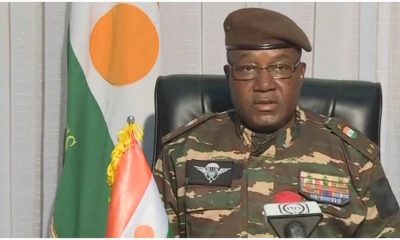
 News2 years ago
News2 years ago“Anytime we want to kill terrorists, President would ask us to take permission from France but they were killing our soldiers-” Niger Republic coup leader
-
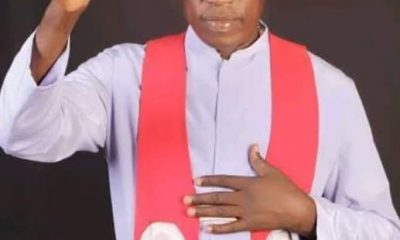
 News2 years ago
News2 years ago“I’m leaving the Catholic church because Bishop Onah is oppressing me,” says Okunerere
-

 News2 years ago
News2 years agoRadio Nigeria’s veteran broadcaster Kelvin Ugwu dies three months after retirement from service
-
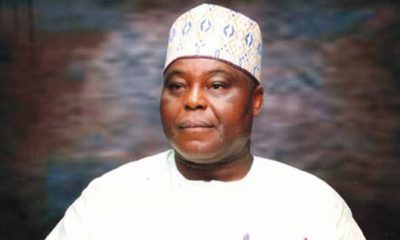
 News2 years ago
News2 years agoDokpesi and the Gazebo Mystique
-

 News2 years ago
News2 years agoTsunami: Tinubu orders dissolution of managements, boards of MDAs, to sack all Buhari’s political appointees
-
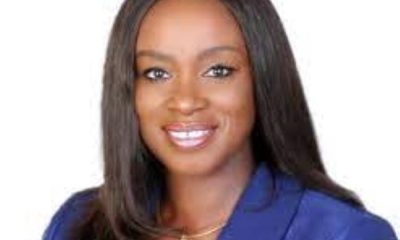
 News2 years ago
News2 years agoPersons against Allagoa’s reforms behind protests at NSITF
